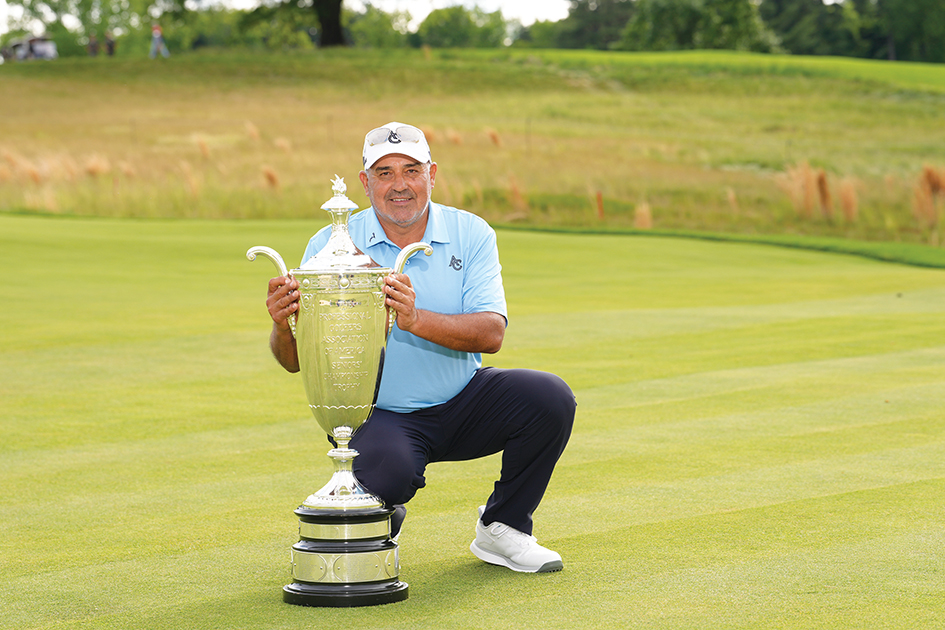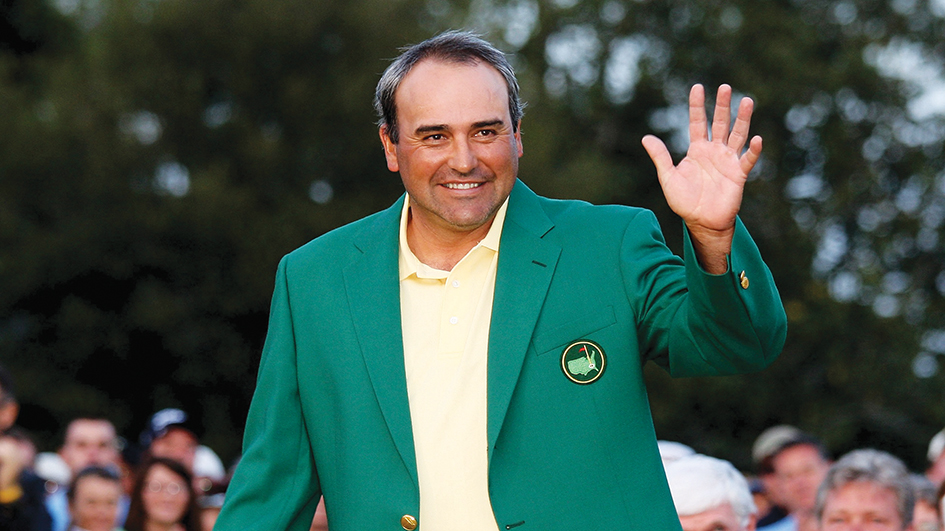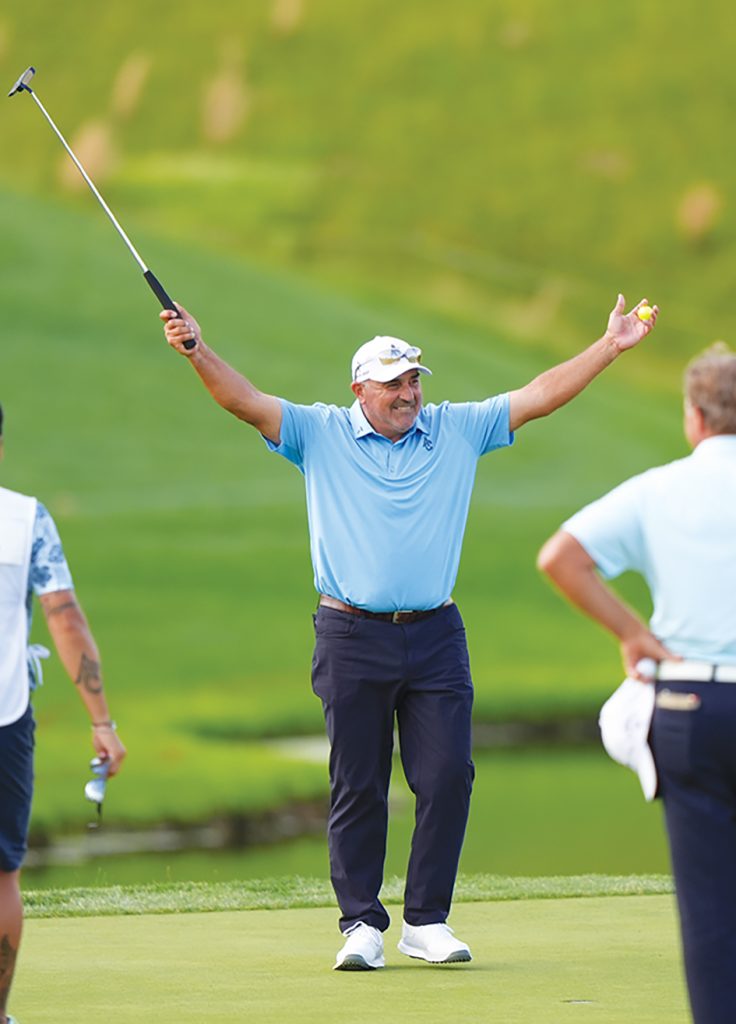 Argentine Angel Cabrera has won two major titles on the PGA Tour Champions in 2025, in making a stunning return to professional golf.
Argentine Angel Cabrera has won two major titles on the PGA Tour Champions in 2025, in making a stunning return to professional golf.
WHEN Angel Cabrera claimed the first two major championships on this year’s US PGA Tour Champions he was responsible for a golfing comeback that most people – himself included – had thought utterly impossible.
Less than two years ago Cabrera, the stocky Argentinian that Australians best remember as the man Adam Scott beat to win the 2013 US Masters, was languishing in a South American jail, convicted of multiple counts of domestic violence.
As he served his time in Argentina’s notorious Carcel de Bouwer, nicknamed ‘the prison from hell’, Cabrera was thinking more about getting out of the place, rather than ever again playing top-level golf.
Indeed, many observers are still scratching their heads over the speed of Cabrera’s return to professional golf, and the welcome he was so generously afforded by the game’s top administrators.
For Cabrera’s crimes – chiefly violence and intimidation directed at the women in his life – were inexcusable.
In seeking an explanation for his repeated assaults of women closest to him, it might be useful to explore his early life, growing up in modest circumstances in Cordoba, a city of 1.6 million people in central Argentina, about 700km northwest of Buenos Aires.
Cabrera’s parents separated when he was four and he was brought up by his grandmother. When he was 16 he left home, moving in with a 28-year-old woman, Silva Rivadero, who lived further down the street, and was already the mother of four children.
Cabrera had two sons with her – Federico and Angel, both who later became professional golfers – but they, too, eventually split up.
 Angel Cabrera, beaten by Adam Scott in a playoff at Augusta in 2013, was the 2009 Masters champion.
Angel Cabrera, beaten by Adam Scott in a playoff at Augusta in 2013, was the 2009 Masters champion.
His troubles with the law began in 2016 when Rivadero alleged he had physically assaulted her and made verbal threats. Two former girlfriends made similar claims and in 2020 Cabrera was ordered to appear before a court on allegations of assault, theft and intimidation.
Instead, without informing local authorities, he flew to Akron, Ohio, to play in a PGA Tour Champions event, Cabrera having reached the requisite age of 50.
On his return to South America he was arrested by Brazilian police and spent nearly five months in jail before being extradited to Argentina to stand trial.
He was convicted for assaulting and threatening a former partner and sentenced to two years in prison. Later that year he was convicted again on similar charges involving another former partner, and received an additional 28-month sentence.
While he was in prison his latest partner, Yamila Alvarez, gave birth to their son Felipe. Cabrera would spend 30 months in jail before being released on parole in August 2023. He married Yamila two months later.
“I made serious mistakes,” Cabrera said at the time. “I refused to listen to anyone, and did what I wanted, how I wanted and when I wanted. That was wrong. I wasn’t the devil, but I did bad things.
“I am deeply embarrassed because I disappointed the people closest to me and everyone who loves me through golf. Golf gave me everything, and I know I will never be able to repay the debt I owe this sport.”
Certainly, officials of the US PGA felt Cabrera had paid that debt. Within weeks he was cleared to play in US PGA-sanctioned events, and last April, against all odds, he returned to the winner’s list, claiming the Tour Champions’ Pro Football Hall of Fame Invitational at Boca Raton, Florida.
His private life aside, Cabrera’s career is the stuff of which Hollywood movies are made. When he was 10 he became a caddy at the Cordoba Country Club, and learned the game playing against other caddies for money.
With his stocky figure and habit of smoking continuously, the big-hitting Cabrera cut a distinctive figure on Argentine golf courses, where he was affectionately known as ‘El Pato’ – Spanish for ‘duck’ – for his waddling gait.
Cabrera turned professional at 20 and sought membership of the European Tour. His first three visits to Q School were unsuccessful, but on his fourth attempt he gained his card. He joined the tour in 1996 and was often in contention, finishing in the top 15 on the Order of Merit seven times.
He broke through for his first win in 2001 – ironically the Argentine Open, which that year was sanctioned by the European Tour on a one-time basis. In 2005 he won the BMW Championship, one of the tour’s biggest events, and reached No 9 in the Official World Golf Rankings.

Cabrera earned enough money on the PGA Tour in 2006, playing as a non-member, to earn a tour card for 2007, the year he won the US Open at Oakmont, edging out Tiger Woods and Jim Furyk by a stroke.
He became the first Argentine golfer to win the US Open and the second (after Roberto De Vicenzo’s 1967 British Open victory) to win a major. It earned him the honour of being Argentina’s sportsman of the year.
Two years later Cabrera, then ranked 69th in the world, became the first golfer from Argentina to win the US Masters, and in 2011 he shared the lead at Amen Corner before falling away to finish seventh behind South African Charl Schwartzel.
In the 2013 Masters he was again in the final pairing, led by two strokes with nine holes to play, and birdied the last hole to tie with Adam Scott. To the delight of millions of Australians, Scott birdied the second playoff hole for an historic playoff win.
Cabrera has the amazing knack of playing his best on the toughest courses. He won only three US PGA Tour events, and two of them were majors.
It’s been the same on the Tour Champions. His three victories so far have included two majors – the Regions Tradition tournament in Alabama in May, and the Senior PGA Championship in Maryland later that same month.
This season alone he’s won more than US$1.5 million, and he’s already fashioned a career that would place him within Hall of Fame status, were it not for his criminal convictions.
“I regret everything that I have done wrongly in my past,” he repeated to reporters. “I am also frustrated that I dumped very, very important years of my life.
“It is one of the worst things that can happen to a human being, not being able to have freedom. But on the other hand, you know, I can tell you that the most important thing I feel right now is the second chance, the opportunity to get back on the right track.”
The post Argentine champ makes the most of his second chance first appeared on Inside Golf. Australia's Most-Read Golf Magazine as named by Australian Golfers - FREE.
